Photographs by Eugene Vanderpool
On Thursday evenings members of the foreign press of Greece congregate in the club room of the Foreign Press Association on Academias Street: Journalists, television and radio correspondents, press photographers and television cameramen from around the world, representing many of the prestigious media organizations, come together to socialize and to exchange notes on the next day’s story, datelined Athens.
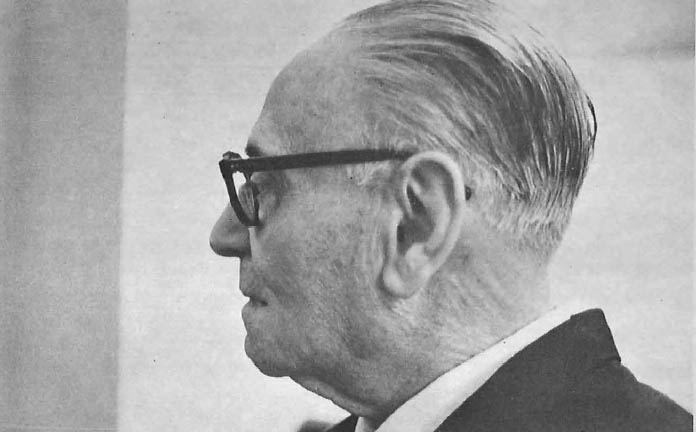
Founded in 1916 to advance the professional interests of foreign correspondents in Greece, the Foreign Press Association today boasts ninety-seven active members, of which half are foreign nationals and half Greek correspondents working for the foreign news media, and one hundred and twenty-six associate members. The Association has had a wide range of activities over the years — from dealing with correspondents’ practical problems, such as the speedier installation of telephone or telex equipment, to sudden crises, such as waging battle with junta officials on behalf of correspondents summarily expelled from the country during the 1967-74 dictatorship.
Much of the day-to-day Greek news is reported to the rest of the world by the wire services whose correspondents in Athens, such as John Rigos of UPI, Jacques Dauphin of Agence France Presse, Petrov Yevgeni of Tass, Philemon Dopoulos of Associated Press, Cesare Rizzoli of Ansa (the Italian News Agency) or Ursula Diepgen (DPA), are the harassed members of the profession. Theirs is a round-the-clock task of reporting the news of the moment to the world — be it Clark Clifford’s fact-finding mission, the national’ football match, the smuggling of arms over the border, or a bomb explosion near the American Embassy. Wire service people are easily identified by that small tremor of the hand, or by the way they jump every time the phone rings to announce the latest catastrophe which must almost instantaneously be sent out over the telex to headquarters in London, Paris, Moscow, Bonn, or New York.

‘As a wire service man, you don’t have a private life,’ says Neocosmos Tzallas, pipesmoking Chief of the Reuters bureau in Greece, who was the first to file the story of the 1967 colonels’ coup d’etat. Mr. Tzallas is now President of the Association. Although wire services are known to compete with each other, at times by a hair’s breadth, they also cooperate with each other. Mrs. Ursula Diepgen of the Deutsche Presse Agentur assures me that during the trials of the Junta, for example, she and the Associated Press man assisted each other by taking turns in covering the endless proceedings.
The newspaper journalists,on the other hand, face daily, as opposed to hourly, deadlines. ‘It took me a very long time to research that story of Spiro Agnew’s associations in Greece,’ says Mary Ann Weaver of the Washington Post, the newspaper which first exposed the corruption of the Nixon Administration. ‘Everytime I mentioned the name of my paper to Agnew’s friends here doors were closed in my face.’
Most of the members of the foreign press work here as ‘stringers’; that is, they are paid by the article. Some are employed on a retainer basis whereby, in addition to payment for articles, they receive a small monthly stipend. To supplement their income, many stringers write for several newspapers or periodicals. The few full-time correspondents here in Greece work for the big influential news organizations. ‘It’s very expensive for any newspaper to keep a staff correspondent abroad,’ says Steven Roberts of the New York Times. He explains that newspapers and periodicals usually have their correspondents stationed in strategic spots around the Mediterranean — in Beirut for coverage of the Middle East, in Rome for coverage of the Western Mediterranean countries, and in Belgrade for the Balkans. Greece and Cyprus have therefore been more or less neglected. Only with the advent of the Ioannides coup of November 1973, which coincided with the Yom Kipur War in Israel, did the New York Times realize the necessity of posting a full-time correspondent here. Because of the fighting in Beirut since 1975, the Christian Science Monitor and the Los Angeles Times also decided to relocate their correspondents to Athens, a base they still use to cover events in the Middle East.
Experienced journalists can recount behind-the-scene stories, at times seemingly innocous anecdotes, that often play a part in the course of history. The doyen of foreign correspondents in Greece is the highly-esteemed Sam Modiano whose newspaper career spans some sixty years and who at the age of eighty-two is still writing for the Sunday and Daily Telegraph. He has fascinating stories about his career as a newspaper publisher, war correspondent for Reuters, and as a defender of the Jewish community of Thessaloniki during the Occupation.
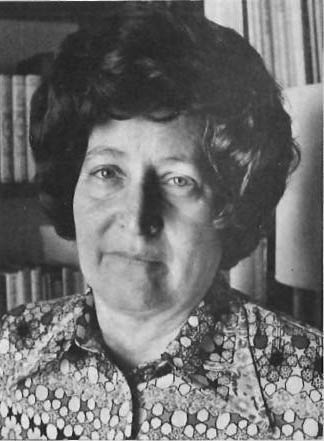
Greek-born John Rigos, who worked for years as a correspondent in the Middle East for the Christian Science Monitor before returning to Greece in 1967, recalls a month spent in Yemen covering the 1964 guerrilla war between the royalist forces of the Imam and the Egyptian-backed republican government. Rigos interviewed the Imam while the Muslim leader was hiding from his enemies in a cave.
During the seven long years of the dictatorship, foreign correspondents here in Greece were often watched day and night by security agents and members of the military police. Ί was constantly aware that I was being followed on my walks between home and office and back,’ says the correspondent of the London Times, Mario Modiano, son of Sam Modiano and one of the most influential journalists in Greece, who was also writing for the New York Times at-that time. Correspondents had their telephones and telexes tapped and were often abused by police at demonstrations. Dean Brelis was filming for CBS News at a student demonstration at the Polytechnic on February 14, 1973, when he was accosted by the police who broke his camera, injured his arm and hauled him off to the police station for questioning. Correspondents during the junta years were often invited to appear at military police headquarters where they were warned that they were writing ‘at their own risk’. For some, there were orders of expulsion with perhaps only forty-eight hours to leave the country. ‘We were just reporting the facts,’ says John Rigos. ‘Most of us were not taking sides. If there hadn’t been bad things to tell about the regime, we would not have told them.’
Needless to say, journalists working for the foreign media, including those of Greek nationality, had an easier time with the junta authorities than did members of the Greek press corps who faced censorship, arrest and imprisonment. Some newspapers were closed down. Ί never knew what would happen every time I wrote an article,’ said Mario Modiano, ‘but I think that the junta authorities must have thought twice before prosecuting me as a correspondent for the London Times. Most of the time they went only as far as harassment, threats and warnings,but no further. According to Nicos Michaelian of Reuters, ‘The Foreign Press Association fully supported and intervened also on behalf of members of the Greek press.’ As Secretary-General of the Foreign Press Association it was Mr. Michaelian’s task to mediate with junta ministers on behalf of fellow correspondents.
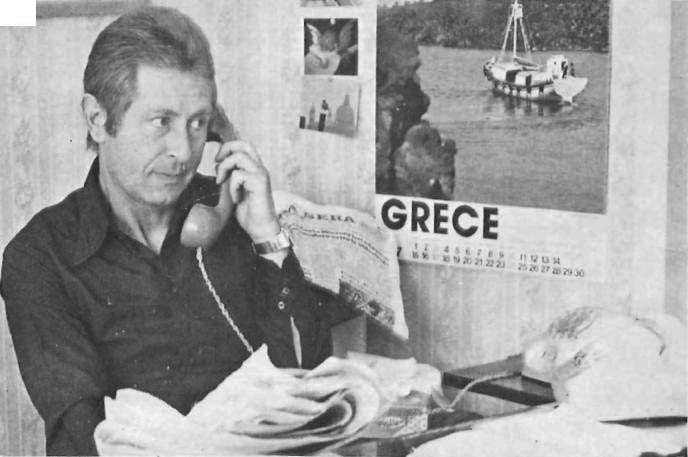
Despite tremendous efforts by the Foreign Press Association to reverse government orders, seven correspondents of foreign nationality were expelled during those years. The dubious reasons given for expulsion were varied. Dutch correspondent Van Hassel was expelled a few days after the coup for reasons of ‘national security’; Balder Bockhoff of Suddeutsche Zeitungwas asked to leave because the figures he had cited in an article about government informants were ‘inaccurate’; William Grumstrup of Copenhagen radio reported some cases of cholera in Greece and was told that his report had hurt Greek tourism; Albert Coerant, a Dutch correspondent, was accused of having acted as a provocateur while covering a student demonstration at the University of Athens, but was allowed to return to Greece after strong protest from the Association. The Junta also expelled Leslie Finer of the BBC and Manchester Guardian, Eva Goetz of the Neue Zurcher Zeitungand Franco de Cleva of Italian radio and television.

David Tonge, who replaced Leslie Finer as journalist for the BBC and is correspondent for the Manchester Guardian and The Observer, was under threat of expulsion when the dictatorship fell in the summer of 1974. His broadcasts, picked up over shortwave, and his newspaper reports while anathema to the dictators, were diligently followed by information-starved Greeks, particularly during the harrowing last years of the junta regimes. The tall and slender thirty-four-year-old Tonge moved restlessly about his paper-strewn office as he told me of the story he wrote about torture of political prisoners by the Ioannides regime which seized power after the fall of Papadopoulos in late 1973. Appearing in the Manchester Guardian in May 1974, the article provoked the British parliament to declare the Greek Ambassador in London a persona non grata.
‘But please don’t make heroes of us,’ emphasized Mr. Tonge. ‘We were just doing our job. The people who were really heroic were those Greek citizens who at great risk to themselves and to their families came forth to let us know what was really happening.’
The information for Tonge’s poignant stories of systematic torturing were gathered from prisoners’ wives waiting outside detention centres hoping to see their husbands, but there was a remarkably wide network of people opposed to the regime who sought out correspondents during the dictatorship years, said Mario Modiano. ‘Because of contacts within the dictators’ office, I knew twenty-four hours in advance that Papadopoulos would abolish the monarchy the next day.’
A long-time resident of Greece is Greek-American Connie Soloyanis, whose articles are written in an entirely different vein reflecting his eighteen years on the mass-circulation New York Daily News, He has now chosen to avoid the pressures, painful legwork, and general rat race that journalists often times have to endure. He produces on a freelance basis humorous but true stories depicting life in-Greece; he gathers information from police files, from innocuous looking items in newspapers or from simply wandering though city streets. He once took a pelican around the world during the junta period, as a publicity stunt for Epirotiki lines. Ί like to travel,’ he says, ‘but when I recently suggested to Epirotiki that tourism might be slacking off and that I should maybe take that pelican around the world a second time, they told me that it wouldn’t work because that dumb pelican is now known as a juntist bird !
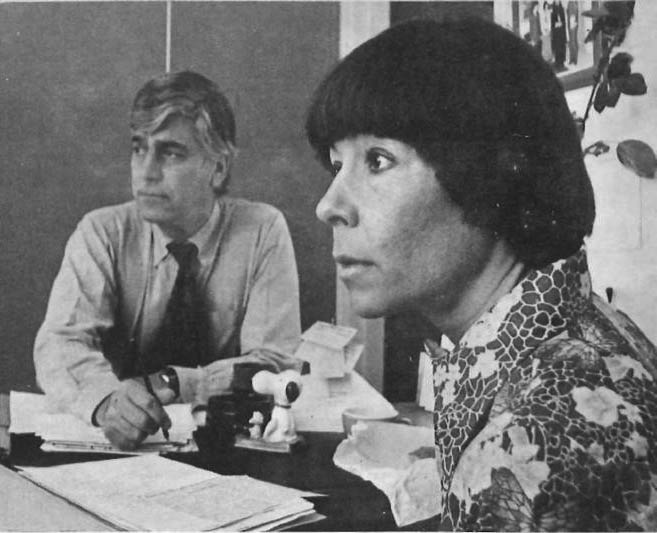
I met Mr. Mustafa Gursel, the respected Turkish correspondent of Milliyet, at ‘The 14’, a cafe on Kolonaki Square. He told me with a wink that the cafe serves as a hangout for lovers and other strangers between the hours of nine and twelve p.m. However, from one a.m. until the wee hours of the morning the place is taken over by weary journalists who come to unwind and exchange stories with colleagues.
A dark, young man with an expressive, lively face, Mr. Gursel can already boast of a multifaceted career. Educated in Turkey and in the United States, he has taught television production and script writing at Ohio State University; worked as an editor and movie script writer in Hollywood; as an actor in Turkey; and as a general consultant to the Turkish Radio and Television Corporation. He was one of the founders of a daily Turkish paper, Politica.
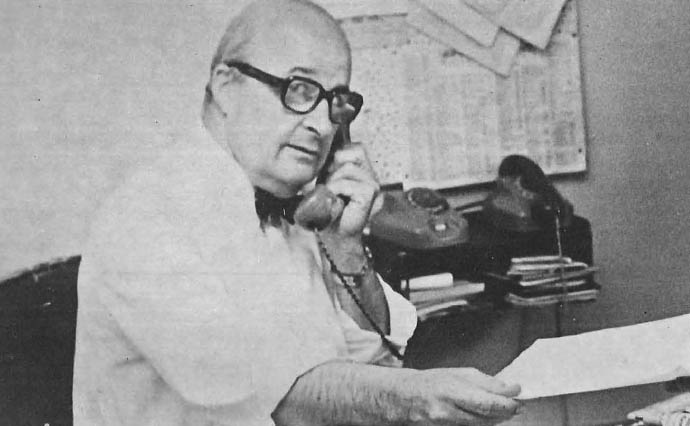
As Milliyet’s correspondent in Athens for the last five and a half months, Mr. Gursel operates a one-man office from his home and usually works long hours filing stories by telephone. He has been unable so far to acquire a telex machine. Milliyet, the third largest circulation daily in Turkey and an influential paper among the intelligentsia and the bureaucrats, is Social Democratic in orientation, but is not connected to any party or special interest. Other Turkish newspapers with correspondents who are members of the Foreign Press Association are Hurriyet, the first largest circulation newspaper, Gunaydin and Tercnman.
Describing some of the frustrations of correspondents, Mr. Gursel told me of an assignment he was given that morning to cover a Balkan skiing competition between a Greek and a Turkish team ‘somewhere in Greece’. After spending several hours determining that the competition was to take place in Volos he discovered that the game had been called off. The Turkish team, unaware of the cancelation, had appeared, however, and was still waiting to play its Greek rival.
When asked if he is hindered in any way as a Turkish correspondent in Greece, Mr. Gursel acts as if he has heard the question before, particularly in the diplomatic cocktail circuit often frequented by journalists. He answers in the negative but also voices the opinion, expressed by many other journalists, that primary sources of information are more or less closed to correspondents here. He also assured me that he felt very much at home in Greece, for in spite of political enmities, Greeks and Turks were much alike. As if to corroborate that point, we are joined at that moment by a ‘very good friend’ of Mr. Gursel’s, a Greek Cypriot with whom we clink glasses. Ironically, on March 21, following this interview, Mr. Gursel was accosted near his home, and beaten by two unknown assailants. He has refused police protection, however. Ί believe in the innate friendliness of the Greek people and in the foundations of democracy of this country,’ he said.
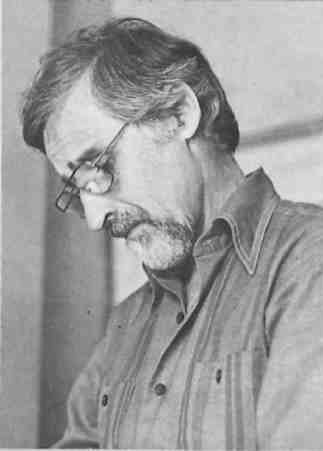
Dean Brelis, distinguished correspondent for CBS and Time magazine, has received, among other major awards in the reporting field, the Overseas Press Club award for best foreign radio reporting in 1964 and two television Emmys for his coverage of the Vietnam War in 1968 and 1969, and for his film story of heroin addiction among the young in the ghettos of the United States. He is the author of four books — fiction and non-fiction — including the novel My Newfound Land which tells of a young Greek boy growing up in the United States. Covering the Middle East as well as Greece and Cyprus, Mr. Brelis, an American of Greek parentage, asked to be stationed in Greece and is enjoying ‘rediscovering my own roots’. He is presently writing a book about the junta years, To Burn a Phoenix, and is ‘watching with great interest the development of democracy in Greece’. Mr. Brelis is married to Washington Posf correspondent Mary Ann Weaver. They both agree that ‘marriage between two journalists might be a good idea’. ‘Knowing how all-consuming the job is, you make allowances for each other,’ adds the dynamic and vivacious Mrs. Brelis who informs me of the unusually high divorce rate among other members of the profession.
Steven Roberts has been the New York Times man in Athens since March 1974. His wife, Kokie Roberts, combines a busy career as mother of two young children with that of freelance reporter, and stringer for CBS radio and television. Mrs. Roberts is not new to the political scene. Her father was Congressman Hale Boggs of Louisiana who mysteriously vanished while en route to Alaska in 1972. Her mother, Lindy, subsequently ran for her husband’s seat and has been twice reelected by overwhelming majorities and was chairperson of the 1976 Democratic National Convention.
The thirty-four-year-old Roberts, whose childhood in the multi-ethnic community of Bayonne, New Jersey no doubt contributes to the special insight he brings to his articles about Greece, joined the staff of the New York Times as research assistant to James Reston immediately upon graduation from Harvard University. Since then he has worked for the Times in Washington, New York and Los Angeles, where he was bureau chief for five years. In his coverage of Greece, Turkey and Cyprus, the soft-spoken Roberts does not focus only on political affairs, but likes to write about the culture and the people. Ί would much rather spend an evening in a taverna just talking to people than at an embassy function,’ he says. Ί would like to tell of what Greece has gone through and of how events have, on an elemental level, affected the lives of individual Greeks.’ In addition to political developments, Roberts writes about the experiences of Greek Americans returning here, of Greek labourers who have left their villages and families to work in the factories of Germany or America, and of their families — left behind sometimes for several years. He writes about Greek poets and of poetry, of newly discovered archaeological sites and of esoteric communities, such as the Zarconians who over the years have preserved a dialect related to ancient Doric. ‘There is tremendous value in freshness,’ says Mr. Roberts enthusiastically. ‘As a relative newcomer perhaps I am able to see stories here that others who have been in the post for many years have missed.’ Mr. Roberts thinks that journalists should get out of Athens more often and visit the villages, small towns and archaeological sites that are the ‘real Greece’.
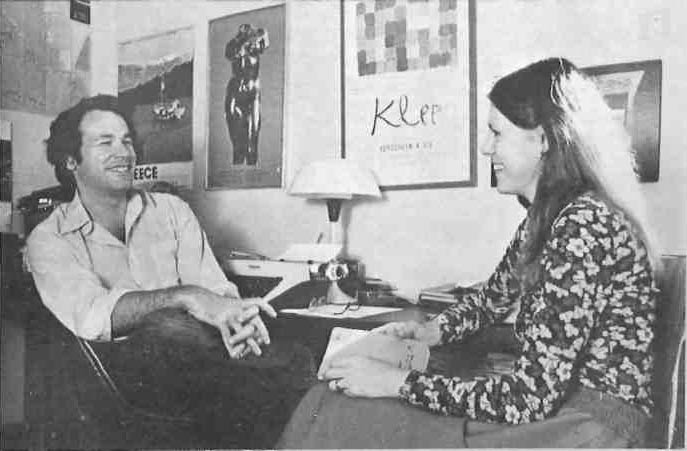
Among the current projects of the Foreign Press Association is negotiating for pension and medical insurance coverage, particularly for its members of Greek nationality. It is also appealing to the government to have press spokesmen appointed in the various government ministries, since most of them, including the Ministry of Foreign Affairs, do not have an official liaison with the press. ‘Mr. Lambrias, the Minister of Information, is the only government spokesman for the press and he is a very busy man,’ says Mrs. Ursula Diepgen, the former President of the Foreign Press Association.
Even though correspondents generally agree that the foreign press corps is well treated by the government, many of them feel that their job is twice as difficult in Greece because of the problems they face gathering information from official sources. ‘There is no delegation of power by the minister to his staff,’ says one disgruntled journalist. ‘To get information you have to call the big man in person. If you’re lucky he’ll come to the phone — most of the time he does not.’ Furthermore, some journalists are frustrated by the fact that although Mr. Lambrias holds daily press briefings, foreign correspondents are often asked to leave when the government deems the information to be a matter of national security.
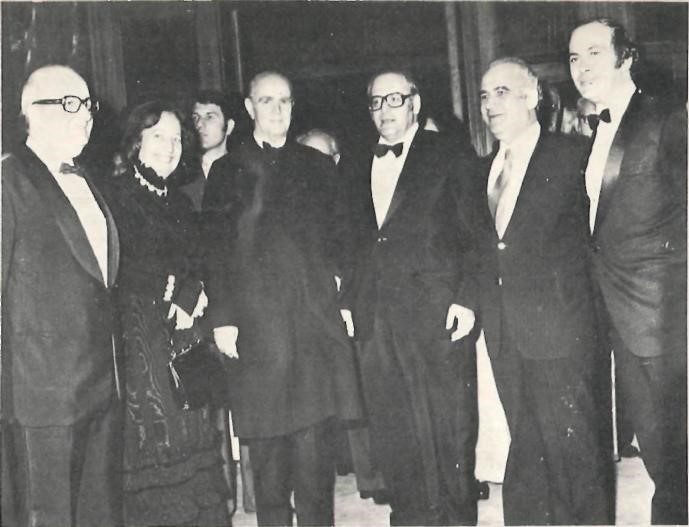
Nevertheless, the individuals representing the fourth estate of so many nations are regarded not only with respect but as a force to be reckoned with. Their sixtieth anniversary was marked by a banquet last year at the Hotel Grande Bretagne, the traditional location for their periodic press luncheons. It was attended by major figures in the local political and diplomatic scenes, including Prime Minister Karamanlis who addressed the gathering.
Foreign correspondents have different media organizations to satisfy, different deadlines to meet and different styles of reporting to follow. They generally have in common, however, that excitement of being where the action is, a curiosity to find out, a desire to inform, a third sense that tells them where a story lies buried and a competitive spirit that perpetually keeps them on the lookout for that scoop that will land their story on page one.







